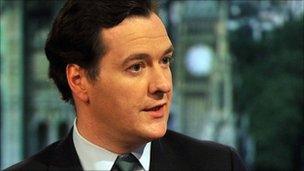Can ministers make promises on public sector pay?
- Published
- comments

The pledge on public sector pay was announced in the coalition government's first Budget
Can politicians keep their promises? I don't mean "do they keep them?". But are they, actually, capable of delivering what they pledge?
In June last year, external, Chancellor George Osborne stood at the despatch box and promised that the lowest paid workers in the public sector would be protected from his two-year pay-freeze: "They will each receive a flat pay rise worth £250" he announced to cheers from his backbenches.
Officials said the pledge would help 1.7 million of the poorest paid public servants in the land.
It was a neat political trick, defusing accusations that his policies favoured the wealthy and that the freezing of public pay was unfair to the least well off.
The trouble was that though the money was set aside, the promise was not one he could make because he doesn't control the pay of most public sector workers: that is largely a matter for local authorities.
This afternoon I asked the Treasury whether they had calculated how many low-paid workers each council in the country employed and ensured that those authorities had the extra cash required to fulfill the chancellor's pledge. The answer, it seems, is no.
A spokesman said the settlement with councils was done "in the round".
He explained that none of the money was "hypothecated" for particular functions, but stressed that "budgets were adjusted" taking account of a whole range of factors.
After the chancellor's announcement, the Treasury wrote a letter to councils urging them to exercise pay restraint, a note that also included a line about looking after the lowest earners.

What the letter didn't do is reflect the chancellor's promise: no mention of £250 for those earning under £21,000; no encouragement or exhortation to support Mr Osborne's initiative.
All the missive does is suggest council chiefs "have regard to the Government's fairness agenda".
How was that ever going to work? Even if larger councils with more low paid staff did get a little extra in their grant to take account of the chancellor's promise, they were not told about it.
The more likely conclusion is that the Treasury cash got lost in the labyrinthine negotiations on the settlement and never had a chance of reaching the specific workers it was supposed to help.
In a debate in the Commons last night, Treasury Minister David Gauke said, external: "Decisions on the pay of local government work forces are for local government employers, rather than central Government, to negotiate. Provision was made in the local government settlement for local authorities to pay the £250 increase, but the fact remains that the decisions are made by local authorities."
Pressed by the Labour MP Frank Field on how Mr Osborne could have let down a million public workers, Mr Gauke said: "Where it is within the Chancellor's control because the money is paid through central Government, those low-paid public sector workers will receive the £250. For those who work in local government, which is not within the control of central Government, we have provided local authorities with the funding to be able to meet that policy objective."
Localism surely cuts both ways: ministers may blame councils for the impact of the cuts. But can they then also claim political credit for spending over which they have no control?